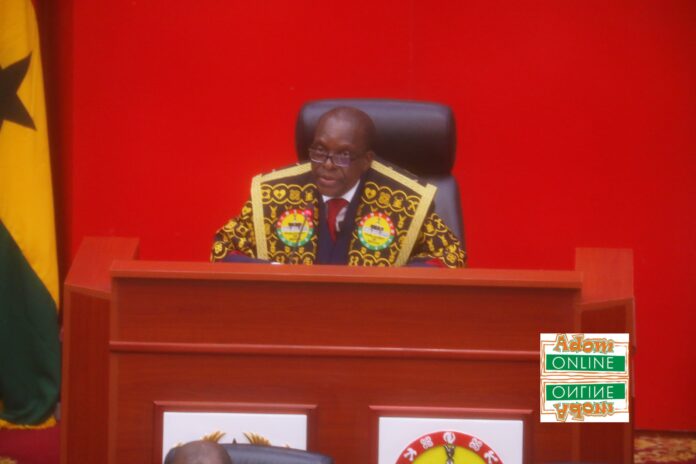Speaker of Parliament, Alban Sumana Kingsford Bagbin, has issued a firm directive to all Members of Parliament, ministers, and deputy ministers currently holding any office of profit or emolument not expressly authorised by law to take immediate steps to regularise their positions.
He stressed that no member of the House, minister, or deputy minister shall accept or retain any such office without first obtaining the permission of the Speaker.
In what he described as a constitutional obligation, Mr. Bagbin warned that failure to comply would constitute a “serious violation” of the 1992 Constitution.
“Silence, oversight or informality shall not be accepted as a substitute for compliance,” the Speaker cautioned.
He has directed all affected officeholders to submit formal requests to the Committee on Office of Profit within 14 days from the date of communication.
Details Required
The request must disclose the nature of the appointment, the responsibilities involved, any associated remuneration, and other relevant information necessary for full assessment by the Committee.
“The Committee shall receive and review all requests for ratification promptly and submit its recommendations to me for determination,” Mr. Bagbin stated.
He urged the Committee to apply the constitutional test under Articles 78(3) and 98(2) “strictly and consistently.”
Safeguarding Public Trust
Mr. Bagbin explained that these provisions, including the relevant Standing Orders, are designed to preserve the balance between the Legislature and Executive, prevent conflicts of interest, and safeguard public confidence.
“These provisions ensure that ministers and members do not convert public service into a platform for personal wealth accumulation, nor use their positions to gain undue advantage in the private sector or state institutions,” he noted.
He also raised concerns about the increasing trend of public officeholders accepting board appointments or professional engagements with financial benefits without parliamentary clearance.
“This trend, if left unchecked, risks eroding the ethical standards of public service, weakening parliamentary oversight and compromising the credibility of Parliament in the eyes of the public,” he warned.
Avoiding Conflicts of Interest
Mr. Bagbin pointed out that holding multiple roles with financial or executive obligations undermines members’ ability to fully execute their core duties.
“Where these appointments are accepted without scrutiny or oversight, there is the additional risk that state boards, corporate entities or regulatory agencies become politicised, and accountability mechanisms are compromised or weakened or both,” he added.
Upholding Constitutional Intent
The Speaker reiterated that the Constitution and the Standing Orders are not discretionary but mandatory.
“The Speaker’s discretion under Articles 78(3) and 98(2) is exercised on the basis of recommendations from the Committee and only where the constitutional tests have been met,” he explained.
He stressed that no member or minister may assume compliance based on silence or informality, urging strict adherence to the constitutional framework.
Committee Oversight
Under Order 224 of the Standing Orders of Parliament, the Committee on Office of Profit, chaired by the Second Deputy Speaker, is empowered to scrutinise all such appointments and ensure conformity.
Mr. Bagbin concluded by calling on all public officeholders to lead by example and adhere to the high standards of accountability and integrity expected of them.
ALSO READ:



